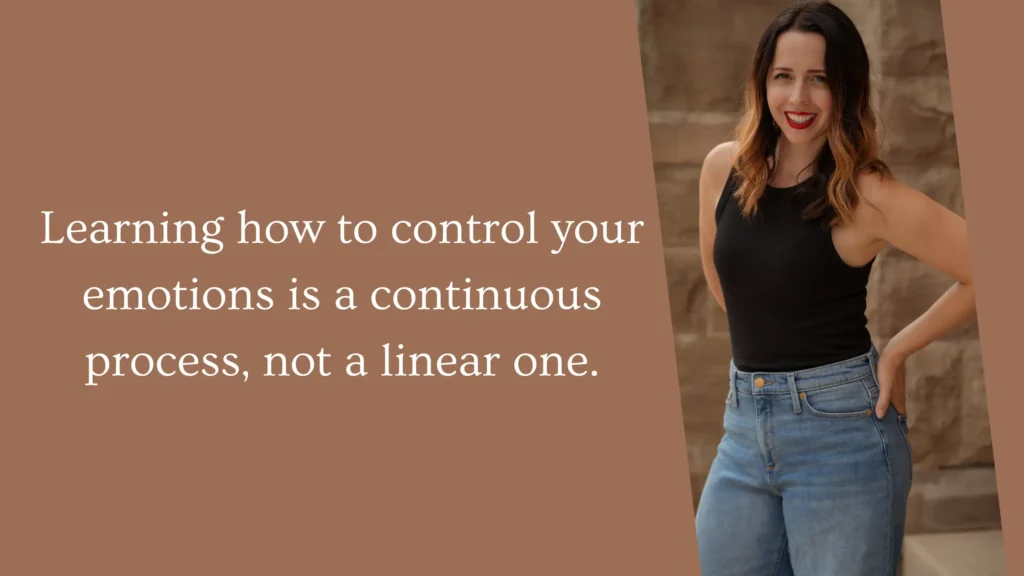Table of Contents
Learning how to control your emotions biblically means embracing a compassionate and faith-driven approach to handling your feelings. I always like to say that our feelings have a seat at the table, but they are not the centerpiece.
It starts with honestly acknowledging your emotions, just as the Psalmists did, expressing everything from joy to sorrow. Bringing these emotions to God in prayer is essential, as Philippians 4:6-7 encourages us to present our concerns to God, promising peace in return (because our trust is not in what we feel).
Seeking wisdom through Scripture, as James 1:5 suggests, helps us understand how to control our feelings constructively.
Sharing our struggles with trusted members of our faith community, in line with Galatians 6:2, can provide much-needed support and empathy.
Meditating on Scripture, such as Psalm 119:105, offers guidance and comfort during emotional challenges.
Embracing forgiveness, as taught in Ephesians 4:32, is crucial for emotional healing. Lastly, maintaining hope and trust in God’s, reassured by Romans 8:28, can provide comfort and perspective, helping you navigate your emotions with faith and grace.
Do you need help understanding forgiveness and forgiving someone? Get my biblical study on forgiveness here!
How to Control Your Emotions
People will share many ways to process and control their emotions. As a certified mental health coach and trauma-informed coach, I often share with my one-on-one coaching clients that it isn’t about getting rid of all of our emotions and never having a negative one again. We usually feel two emotions at once: joy and grief, or hope and sadness.
In my coaching sessions, clients often share with me how they repress or suppress their emotions because they are unsure how to control them. However, if we never confront or get honest with our feelings, it will be hard to learn how to control our feelings.
The first step is often giving ourselves permission to feel because, for many of us, we have assumed (typically by others) that our pain doesn’t matter.
Here are a few more ways you can practice emotional processing (ways to learn to control emotions):
Acknowledge and Accept Your Emotions:
- Example: Begin by recognizing and naming your emotions without judgment. Understand that all positive or negative emotions are valid and part of the human experience.
Identify Triggers:
- Example: Reflect on what situations, thoughts, or events triggered your emotional response. Keeping a journal can be helpful in identifying patterns and triggers.
Develop Healthy Coping Mechanisms:
- Example: Find healthy ways to cope with your emotions, such as exercise, creative activities, or spending time in nature. Avoid unhealthy coping strategies like substance abuse or avoidance.
Express Your Emotions:
- Example: Talk to a trusted friend, family member, or therapist about your feelings. Writing in a journal or engaging in expressive arts can also effectively express emotions.
Use Grounding Techniques:
- Example: When emotions feel overwhelming, use grounding techniques like focusing on your senses, describing your surroundings, or holding a comforting object. (I also personally love to get outside and ground myself with my feet in the grass.)
- Example: If emotions are too intense or persistent, consider seeking help from a coach or counselor. You don’t have to try and continue to do it alone. Learn more about working one-on-one with me as your mental health or trauma-informed coach here!
Learning how to control our emotions is a continuous process, not a linear one. Sometimes, we need someone to come alongside us and help us see things we couldn’t see ourselves.
How to Turn Off Your Emotions
It’s understandable why someone might want to “turn on” their emotions—after all, emotions help us feel alive, connected, and engaged with the world. If you’ve been feeling numb or disconnected, the idea of feeling something again can seem like the key to healing.
From a biblical perspective, though, emotions are not the ultimate guide to healing. While God created emotions as a valuable part of our human experience, they were never meant to lead us (only inform us). Proverbs 3:5-6 reminds us to trust in the Lord with all our hearts rather than leaning on our own understanding.
Emotions can shift with circumstances, but true freedom and healing come from renewing our minds in truth (Romans 12:2) and allowing God to work in our hearts, not just how we feel in the moment. (I know what it’s like to establish trust in God. Not that He broke that trust with me, but that I felt hurt thinking He hurt me.)
Emotions are important, but simply “turning them off” doesn’t address the root of pain. Emotions are messengers, not healers. You can feel sadness, anger, or even relief, but if the underlying wounds aren’t acknowledged and processed, those emotions won’t bring lasting freedom. True healing involves addressing core beliefs, unprocessed trauma, and unhealthy thought patterns—not just ignoring them, comparing them, or minimizing them.
Instead of trying to turn emotions off as a solution to learning how to control your emotions, the real path to healing is allowing yourself to process your pain with God, challenge unhelpful beliefs, and create space for emotions to serve their true purpose—helping you navigate life rather than controlling it.
Emotional Regulation Examples
Emotional regulation is more than just controlling how we feel—it’s about responding to our emotions in a way that honors both our well-being and our faith. Instead of being ruled by our emotions or shutting them down completely, we can learn to manage them with wisdom and grace.
The Bible reminds us we have self-control (Galatians 5:22-23) and the ability to our minds (Romans 12:2), which aligns with more practical strategies for regulating emotions.
Here are three practical ways to regulate emotions in a healthy, God-honoring way.
Naming the Emotion Without Judgment – Instead of suppressing or being consumed by emotions, acknowledging and naming them helps bring clarity. Saying, “I feel frustrated right now,” rather than “I’m a terrible person for feeling this way,” creates space for processing. Proverbs 4:7 reminds us that wisdom is key, and understanding our emotions allows us to handle them wisely. This practice engages the prefrontal cortex, helping regulate emotional responses rather than being driven by them.
Practicing Rhythms of Rest – Emotional overwhelm often comes when we neglect rest. Taking breaks, engaging in hobbies, or spending time in quiet reflection helps regulate emotions by giving the nervous system time to reset. Jesus modeled this by withdrawing to pray (Luke 5:16), showing us that stepping away to recharge is essential for emotional well-being. Rest reduces cortisol levels, lowering stress and improving emotional stability.
Using Movement to Release Emotions – Physical activity helps process emotions in a healthy way. Whether through walking, stretching, or deep breathing, movement regulates the nervous system and prevents emotions from becoming trapped in the body. Psalm 55:22 encourages us to cast our burdens on the Lord, and sometimes, that includes releasing built-up emotional tension through movement. Exercise can increase serotonin and dopamine, which help regulate mood and stress.
Emotional regulation doesn’t mean ignoring or suppressing feelings—it means stewarding them well so they don’t control us. We can learn to navigate emotions with greater peace and clarity rather than being overwhelmed by them. As we grow in emotional maturity, we also grow in spiritual strength, learning to trust God with our emotions rather than letting them dictate our actions.
How to Deal with Emotions
Learning to control our emotions isn’t about fixing them. We are not a project to be fixed. Emotions can feel overwhelming, I know.
Here are a few ways to help us learn how to control and deal with our emotions.
1. Acknowledge and Name Your Emotions
Instead of suppressing or ignoring emotions, take a moment to recognize and name what you’re feeling. Say to yourself, “I feel anxious,” or “I’m frustrated right now.” This simple act brings clarity and helps separate the emotion from your identity. Proverbs 4:7 reminds us that wisdom is key, and understanding your emotions is part of stewarding them well.
2. Pause and Breathe Before Reacting
Strong emotions can tempt us to react impulsively, but taking a pause allows space for self-control. Try deep breathing, counting to ten, or saying a short prayer before responding. James 1:19 encourages us to be “quick to listen, slow to speak, and slow to become angry.” Giving yourself a moment to reset can prevent regretful actions.
3. Process Your Emotions with God
Bring your emotions before God in prayer. Psalm 62:8 says, “Pour out your heart before Him; God is a refuge for us.” God cares about your emotions, whether you’re emotionally overwhelmed, angry, or sad. Journaling your feelings, praying honestly, or meditating on Scripture can help you process them with His guidance.
4. Challenge Negative or Untrue Thoughts
Your thoughts influence your emotions. If you are stuck in fear, shame, or negativity, ask: “Is this thought true?” (2 Corinthians 10:5 encourages us to take every thought captive.) Reframe negative thinking by replacing lies with biblical truth. For example, if you feel unworthy, remind yourself that you are fearfully and wonderfully made (Psalm 139:14).
5. Engage in Healthy Outlets
Sometimes emotions need a physical or creative release. Movement (walking, stretching), creative expression (art, music, writing), or talking with a trusted friend can help you process emotions in a healthy way. Jesus often withdrew to quiet places (Luke 5:16), showing us that stepping away for renewal is valuable.
Managing Your Emotions
One practical thing you can do to improve your ability to communicate and express your emotions is to practice emotional journaling. This allows a safe place for your emotions to go as we learn how to control them. Here’s how it can help and some steps to get started:
How It Helps:
- Clarifies Thoughts and Feelings: Writing down your emotions helps you to articulate what you’re feeling and why. It’s a way of processing emotions in a private space.
- Reduces Emotional Intensity: Putting your feelings into words can lessen their intensity, making them more manageable.
- Provides Insight: Regular journaling can reveal patterns and triggers in your emotional responses.
- Improves Communication: Practicing how to express your emotions in writing can translate into better verbal communication.
Steps to Get Started:
- Set Aside Time: Dedicate a specific time each day to write in your journal, even if it’s just for a few minutes.
- Find a Comfortable Space: Choose a quiet and comfortable place where you can reflect without distractions.
- Be Honest: Write honestly about what you’re feeling, without worrying about grammar or structure. The goal is to express yourself freely.
- Identify Emotions: Start by naming the emotion you’re experiencing (e.g., anger, sadness, joy). Use an emotion wheel or list if needed to pinpoint your feelings more accurately.
- Describe the Situation: Write about what happened to trigger this emotion. Include details about the event, people involved, and your reactions.
- Explore the Why: Reflect on why you feel this way. Consider underlying factors such as past experiences, beliefs, or unmet needs.
- Consider Solutions: Think about how you can address the situation or emotion constructively. This might include setting boundaries, having a conversation, or practicing self-care.
- Review and Reflect: Periodically review your journal entries to gain insights into your emotional patterns and growth.
By regularly engaging in emotional journaling, you can become more attuned to your feelings, articulate them more clearly, and communicate them more effectively in your interactions with others.
I know some of my clients do not prefer to journal because they may be worried someone would read what they wrote, or they have a hard time sitting with their feelings. If you have a hard time journaling, start small. Maybe journal through what you did for the day or what you read. If you don’t want to write at all, find another way to process them, such as talking out loud or recording yourself processing through what you are feeling.
Books on How to Control Your Emotions
- Face Off with Your Feelings by Jessica Hottle
- Untangle Your Emotions by Jennie Allen
- Forgiving What You Can’t Forget by Lysa Terkeurst
- Bible Study on Stress and Anxiety by Jessica Hottle





